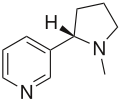Psychoactive plant
Psychoactive plants are plants that have psychoactive substances in them. These substances can alter one's consciousness, mood, or perception. The use of psychoactive plants dates back to prehistoric times and continues to this day in various cultures and societies around the world.
History[edit]
The use of psychoactive plants in rituals and for medicinal purposes has been a part of human culture for thousands of years. Evidence of this can be found in ancient cave paintings and archaeological sites. Some of the earliest known uses of psychoactive plants were by the indigenous peoples of the Americas.
Types of Psychoactive Plants[edit]
There are many different types of psychoactive plants, each with its own unique properties and effects. Some of the most well-known include:
- Cannabis: This plant contains the psychoactive substance tetrahydrocannabinol (THC), which can produce feelings of euphoria, relaxation, and altered perception.
- Peyote: This small cactus contains the psychoactive substance mescaline, which can cause hallucinations and altered perception.
- Psilocybin mushrooms: These mushrooms contain the psychoactive substance psilocybin, which can cause hallucinations and profound changes in consciousness.
- Ayahuasca: This brew made from various plants contains the psychoactive substances dimethyltryptamine (DMT) and monoamine oxidase inhibitors (MAOIs), which can cause intense hallucinations and spiritual experiences.
Effects[edit]
The effects of psychoactive plants can vary greatly depending on the type of plant, the dosage, the method of consumption, and the individual's personal physiology and psychology. Some common effects include changes in perception, mood, consciousness, cognition, and behavior. These effects can be therapeutic, recreational, spiritual, or harmful, depending on the context.
Risks and Controversies[edit]
The use of psychoactive plants is not without risks. Some plants can cause physical harm, such as poisoning or addiction. Others can cause psychological harm, such as anxiety, psychosis, or trauma. The use of psychoactive plants is also controversial due to legal, ethical, and societal issues.
See Also[edit]
References[edit]
<references />
-
Psychoactive_plant
-
Psychoactive_plant
-
Psychoactive_plant
-
Psychoactive_plant
-
Psychoactive_plant
-
Psychoactive_plant
-
Psychoactive_plant
-
Psychoactive_plant
-
Psychoactive_plant
-
Psychoactive_plant
-
Psychoactive_plant
-
Psychoactive_plant
Ad. Transform your life with W8MD's Budget GLP-1 injections from $75


W8MD offers a medical weight loss program to lose weight in Philadelphia. Our physician-supervised medical weight loss provides:
- Weight loss injections in NYC (generic and brand names):
- Zepbound / Mounjaro, Wegovy / Ozempic, Saxenda
- Most insurances accepted or discounted self-pay rates. We will obtain insurance prior authorizations if needed.
- Generic GLP1 weight loss injections from $75 for the starting dose.
- Also offer prescription weight loss medications including Phentermine, Qsymia, Diethylpropion, Contrave etc.
NYC weight loss doctor appointmentsNYC weight loss doctor appointments
Start your NYC weight loss journey today at our NYC medical weight loss and Philadelphia medical weight loss clinics.
- Call 718-946-5500 to lose weight in NYC or for medical weight loss in Philadelphia 215-676-2334.
- Tags:NYC medical weight loss, Philadelphia lose weight Zepbound NYC, Budget GLP1 weight loss injections, Wegovy Philadelphia, Wegovy NYC, Philadelphia medical weight loss, Brookly weight loss and Wegovy NYC
|
WikiMD's Wellness Encyclopedia |
| Let Food Be Thy Medicine Medicine Thy Food - Hippocrates |
Medical Disclaimer: WikiMD is not a substitute for professional medical advice. The information on WikiMD is provided as an information resource only, may be incorrect, outdated or misleading, and is not to be used or relied on for any diagnostic or treatment purposes. Please consult your health care provider before making any healthcare decisions or for guidance about a specific medical condition. WikiMD expressly disclaims responsibility, and shall have no liability, for any damages, loss, injury, or liability whatsoever suffered as a result of your reliance on the information contained in this site. By visiting this site you agree to the foregoing terms and conditions, which may from time to time be changed or supplemented by WikiMD. If you do not agree to the foregoing terms and conditions, you should not enter or use this site. See full disclaimer.
Credits:Most images are courtesy of Wikimedia commons, and templates, categories Wikipedia, licensed under CC BY SA or similar.
Translate this page: - East Asian
中文,
日本,
한국어,
South Asian
हिन्दी,
தமிழ்,
తెలుగు,
Urdu,
ಕನ್ನಡ,
Southeast Asian
Indonesian,
Vietnamese,
Thai,
မြန်မာဘာသာ,
বাংলা
European
español,
Deutsch,
français,
Greek,
português do Brasil,
polski,
română,
русский,
Nederlands,
norsk,
svenska,
suomi,
Italian
Middle Eastern & African
عربى,
Turkish,
Persian,
Hebrew,
Afrikaans,
isiZulu,
Kiswahili,
Other
Bulgarian,
Hungarian,
Czech,
Swedish,
മലയാളം,
मराठी,
ਪੰਜਾਬੀ,
ગુજરાતી,
Portuguese,
Ukrainian











